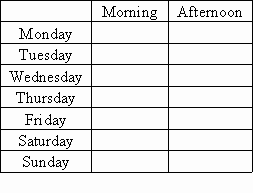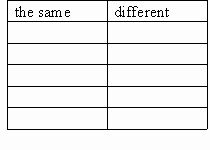题目内容
A Lesson from the Elder
Grandfather was an elder Cherokee Native American who had a wrinkled, nut brown face and kind dark eyes. His grandson often came in the evening to sit on his knee and asked the many questions that children would ask.
One day the grandson came to his grandfather with a look of anger on his face and the following story. “Father and I went to the store today and because I helped him, he bought me a present---a jack-knife. I went outside to wait for father and to admire my new knife in the sunlight. Some town boys came by and saw me. They surrounded me and started saying bad things. They called me dirty and stupid and said that I should not have such a fine knife. The largest of these boys pushed me back and I fell over one of the other boys. I dropped my knife and one of them picked it up and they all ran away laughing. I hate them. I hate them all."
The elder Cherokee, with eyes that had seen too much,
lifted his grandson's face so his eyes looked into the boy's face. Grandfather
said, "Let me tell you a story. I, too, at times, have felt a great hate
for those who have taken  so
much with no sorrow for what they do. But hate wears you down and does not hurt
your enemy. It is like drinking poison and wishing your enemy would die. I have
struggled with these feelings many times. It is as if two wolves are inside
me.... It is a terrible fight.
so
much with no sorrow for what they do. But hate wears you down and does not hurt
your enemy. It is like drinking poison and wishing your enemy would die. I have
struggled with these feelings many times. It is as if two wolves are inside
me.... It is a terrible fight.
One wolf is good and does no harm. He lives in harmony with all around him and does not take offense when no offense was intended. It will only fight when it is right to do so and in the right way. This wolf stands for joy, peace, love, hope, sharing, modesty, kindness, friendship, sympathy, generosity, truth, and faith.
The other wolf is full of anger. The least thing will set off his fiercest temper. He fights everyone, all the time, for no reason. He cannot think because his anger and hate are so much. It is helpless anger, for his anger will change nothing. This wolf represents fear, envy, greed, self-pity, guilt, lies, false pride and superiority.
Sometimes, it is hard to live with these two wolves inside me for both of them try to control my spirit. This same fight is going on inside you and inside every other person too.”
The boy looked into his grandfather's eyes and asked, "Which wolf will win?" The old Cherokee simply replied.... "The one you feed."
1.The boy was angry because __________.
A. he was not satisfied with his present
his back was badly injured in a fight
he had waited for his father for too long
his jack-knife had been taken away by some boys
2.How does the good wolf do things in the story?
A. He never fights against others.
B. He tries to get on well with others.
C. It is hard for him to live with other wolves.
D. Sometimes he had a terrible fight because some one hit him.
3.We can learn from the third paragraph that _________.
A. “hate” is healthy
B. “hate” hurts oneself
C. “hate” is complicated
D. “hate” harms one’s enemies
4.What did Grandfather mean by saying "The one you feed" in the last paragraph?
A. We should feed the two wolves equally.
B. Living in harmony with others is important.
C. Our feelings should be expressed at the right time.
D. The choices we make determine who we will become.
1.D
2.B
3.B
4.D
【解析】
试题分析:本文叙述了一个男孩因为他的小刀被其他一些男孩拿走了而生气并且满怀仇恨。他的爷爷通过一个故事说明了一个道理,仇恨没有伤到敌人,反而伤到了自己。
1.细节理解题。根据I dropped my knife and one of them picked it up and they all ran away laughing. I hate them. I hate them all.可知这个男孩生气是因为他的小刀被一些男孩拿走了,故选D。
2.细节理解题。根据One wolf is good and does no harm. He lives in harmony with all around him and does not take offense when no offense was intended. It will only fight when it is right to do so and in the right way.可知故事中好的狼想要和其他人好好相处,故选B。
3.细节理解题。根据 But hate wears you down and does not hurt
your enemy. It is like drinking poison and wishing your enemy would die.可知第三自然段主要讲了“仇恨没有伤到敌人,反而伤到了自己”,故选B。
But hate wears you down and does not hurt
your enemy. It is like drinking poison and wishing your enemy would die.可知第三自然段主要讲了“仇恨没有伤到敌人,反而伤到了自己”,故选B。
4.猜句意题。根据文章内容可知,"The one you feed"意思是我们自己来决定哪只狼获胜,故选D。
考点:故事类短文阅读。

词语释义(从Ⅱ栏中为Ⅰ栏选择意义相同的词汇)。
|
Ⅰ |
Ⅱ |
|
(1) be back _____ |
A.the girl who is not married |
|
(2) pupil _____ |
B.take a picture |
|
(3) have a class _____ |
C.hate |
|
(4) be like _____ |
D.not…any more |
|
(5) dislike _____ |
E.get married |
|
(6) not…any longer _____ |
F.pleased |
|
(7) glad _____ |
G.student |
|
(8) take a photo _____ |
H.look like |
|
(9) Miss _____ |
I.have a lesson |
|
(10)be married _____ |
J.get back |
从方框中选择最佳选项,完成对话,并把字母序号填在后面的方格中。
|
A:Hello, Lucy! 1 Is this your book?
B:No, it’s not mine. Where did you find it?
A:Under the bench in the gym.
B:When did you find it?
A: 2 .
B:Oh, 3 . Because Class Two had a lesson in the gym just now.
A:Let’s ask the teacher of Class Two. 4 .
B:I’m sorry I can’t go with you. I must practice the piano right away.
A: 5 . I have to go alone. See you.
B:See you.
1 2 3 4 5
(A)
China’s Manned Space Program
| The first stage | The second stage | The third stage |
| Time: October 15,2003 Spaceship: Shenzhou V Main events: Chinese spaceman Yang Liwei was sent into space. He went around the earth 14 times in his one-day flight. China became the third country to succeed in manned space flight. | Time: October 12, 2005 Spaceship: Shenzhou VI Main events: Chinese spacemen Fei Junlong and Nie Haisheng were both sent into space. On October 17, the two Chinese space heroes safely returned to the earth. | Future plans 1.China will make a manned moon landing at a proper(适当的)time around 2017. 2.China plans to set up a permanent(永久的)space lab ,and build its engineering system in the near future. |
根据文章内容,选择正确答案。
1The Chinese spaceman traveling in space in the autumn of 2003 is .
A.Yang Liwei B.Fei Junlong C.Nie Haisheng D.Zhai Zhigang
2 Before China, how many countries had already sent their spaceship into space?
A.Only one B.Two C.Three D.We don’t know
3 Shengzhou V circled the earth in space .
A.one time B.four times C.five times D.fourteen times
4 During the second stage ,Chinese spacemen stayed in space for .
A.one day B.four days C.five days D.fourteen days
5 Chinese spacemen will possibly walk on the moon around .
A.2007 B.2008 C.2010 D.2017
(B)
When an earthquake hit a small town, many houses fell down. After the earthquake,all the newspapers reported many stories about some of the families who were in trouble.
One Sunday, when I was reading a newspaper, a special picture touches(触动)me. It suggested everyone should give something helpful to the people in the earthquake. I thought that this would be a good chance to teach my children to help those who were less lucky than themselves. I said to my seven-year-old twins, Brad and Brett, and three-year-old Meghan. "We have so much, and these poor people now have nothing. We'll share what we have with them.”
I filled a box with foods and clothes. While I was doing this, I encouraged the boys to choose their toys and give away some of their less favorite things. Meghan watched quietly when the boys took out their old toys and games and put them together. Then she walked away. A few minutes later she came back with Lucy, her much-loved doll. She put the doll on top of the other toys. "Oh, dear,” I said. “You don't have to give Lucy. You love her so much.” Meghan said, “Lucy makes me happy, Mommy. Maybe she'll make another little girl happy, too.”
I looked at Meghan for a long moment. She taught me a lesson. It's easy to give something that we don't want any more,but harder to give what we cherish(珍爱), isn’t it?
根据短文内容,判断下列句子的正误,正确的写(T),错误的写(F)。(5分)
6 An earthquake happened in the writer’s hometown.
7 The writer learned the news of earthquake on the radio.
8 The writer decided to buy some clothes for those people in trouble.
9 The writer didn’t let Meghan give her much-loved doll.
10 The writer thinks it is more difficult to give what we love a lot.




